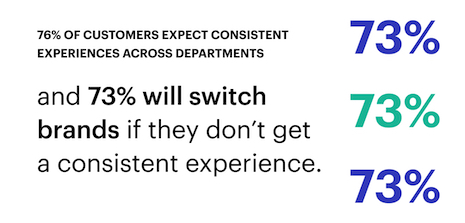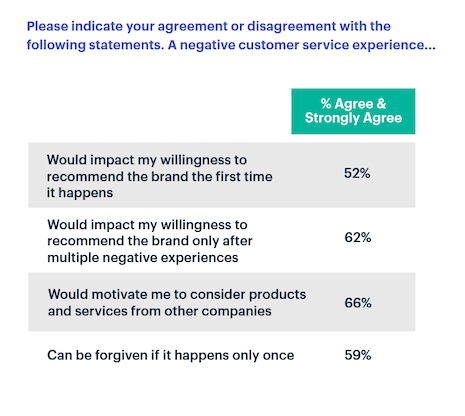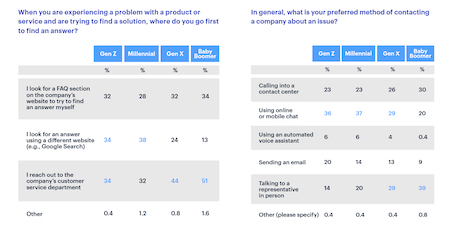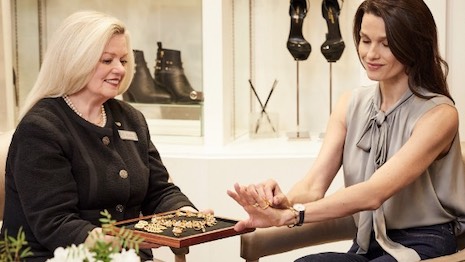When it comes to customer service, a new report proves that brand loyalty is always on the line.
Leading enterprise experience platform Medallia, Inc., is out with Special Report: The New Customer Expectations for the Contact Center, which frames customer service-centric insights with crucial context for businesses conducting commerce today. As the backbone of the sector’s retail layout, both offline and on, learnings included as part of the release prove especially applicable to luxury.
“Organizations that recognize the true potential of the contact center and invest in efforts to improve those experiences will be positioned to reduce operational costs, increase customer retention, and get ahead of the competition,” said Rachel Lane, contact center solutions principal at Medallia, Inc., in a statement.
"In a time when consumers across generations expect empathy and understanding — or else they will look for that experience with another brand — it's critical for contact centers to provide personalized experiences for their customers."
For the report, findings are based on an analysis from the Medallia Institute of a survey consumer panel conducted by provider Sense360 by Medallia in October 2022 of 1,047 individuals based in the U.S. who indicated they had interacted with a company’s customer support team within the last six months.
Customer service staples
Arguably at the heart of all luxury labels, company contact centers have a bearing in almost every important aspect of a business’s objectives, from customer acquisition to retention, to the establishment of a brand’s market edge.
Medallia's research exercise is rooted in the operative function, which ranges in form, from in-store interactions to digital interfaces.
The study at hand explores the ways in which consumer engagement – and, more specifically, a brand’s ability to meet shopper expectations here – can make or break bottom lines.
The firm, which counts Mercedes-Benz, the Four Seasons and Sephora among clients, wastes no time in uncovering insights.
 Almost four of every five consumers have come to expect consistency in service across departments. Image credit: Medallia, Inc./Salesforce
Almost four of every five consumers have come to expect consistency in service across departments. Image credit: Medallia, Inc./Salesforce
As outlined by the report, 73 percent of consumers want to provide feedback about their experience after a customer service interaction, but are more likely to do so with positive experiences compared to negative experiences.
Ninety-five percent say that it is important that contact center agents both take the time to understand why the consumer is contacting customer service, and from there, help find a solution that meets their specific needs.
Additionally, 96 percent of survey takers mentioned that a service provider’s ability to demonstrate empathy during an interaction is of utmost importance.
 Image credit: Medallia, Inc.
Image credit: Medallia, Inc.
Of a list of factors consumers care most about when reaching out to customer support, the ability to communicate with a real person and not a bot, get instant responses, and have complaints resolved in real-time rank highest, coming in as the top three.
In terms of reasonable wait times, survey results show that when issues pop up, most consumers aren’t willing to spend more than 5 to ten minutes digging for info online or holding for the next available representative.
A majority of respondents – 66 percent – prefer to be given a call-back option.
Luxury learnings
Medallia’s research exercise also reveals that customer service preference may vary greatly by demographic.
In fact, Gen Z and millennial shoppers are almost twice as likely than baby boomers to say that a recent interaction with a chatbot or automated voice assistant was helpful.
Meanwhile, a human representative checks out as the first channel of choice for Baby Boomers, while online or mobile chats were found to be the preferred channel for Gen Z and millennial consumers.
 Image credit: Medallia, Inc.
Image credit: Medallia, Inc.
Experts caution brands against drowning out the modes of outreach most comfortable to mature consumers (see story), especially in the current era of tech-first commerce.
All in all, Special Report: The New Customer Expectations for the Contact Center is comprehensive in scope, touching on consumer sentiments when it comes to automation, communication style and feedback opportunities for customer service.
Considering 64 percent of global businesses report that they are still recovering from the pandemic (see story), versus the collective expression of a readiness to switch brands in a landscape with more options than ever before, customer loyalty must truly be earned.
{"ct":"MbBqvBaLTV6pWC4\/v1oYVTgURYEU6eYseYe8VTvMZdxCGTIE+MXPh\/kwyjCs1vat3q8NX2MWFQi+y4\/BW9979c5untFxCSvOOffyADRSz\/Q0xUh6204IV4oKjEixFfNzwvljPyBlfhxjR\/\/RO6N8hKwn78pa82vEXl4s0BABU0asyh1TArc\/d1hqz537X56l7mo8ZWjHC+6IU02fglrJPrLX+o2UrHMysWS6y2qAr6Fp\/0esQ1bOYf85AVsox2cZqRpxZV2I8IkxM49ERVy\/omFr86K1nhjV5FCsfsYVwsQMr7ZviSoN0\/nqxuJINFBZuJN5OSU0JdAh2fAWf7dGiXQnz3Mi1w0k89johwhBPeFxQpcod6b2wqYwtQRGr9ul590JjtAzKlvcOHKxI8MpCuhzMn4NHnzdv4vTDBXN5EFZYf1\/Q\/o6Irx0fxB7gZPLFPSP76VcStDjEAeRYzASHNjSWnyMN9iSAA6c6q9fLzejXPJWdTlxQ4J8WotsMd0osW1KM9MPrzjn+fpNgUbOD9MqjgjhgR+JisiB94Mp9NkgmD+BUgOo3EV4BC93KtnDJGvvWTJ7EHdzRhvygYQ9ow+6APBz9Ohlk62VcwqnGSZfG81bdw6ThbaYXua2xJ\/ubo2djpB9QLNUleREMwwTSTYtHhabLPNLMPfMxasJ98\/xSnOjdiwZoy+MDJjt9vMiUQZWBuzrlixciIt7bGe4UsrcSbf1w36apTl0pgDPEewD3ipkShYoIN5\/WC4PU1SG+6kpIYkGAG0jgD6xbp6EeSqVEva8SBVb79M9V7tDfpyfwvf9\/hcBCYD0qUv9ToB6u9LF2jwI2mIW27KX+NaBlimaZv5fovipOwkqWQZr65q1\/tJYt4fNPr2y6Eb7zknOhiAhoZxd2OOTr2UFrabfOKtmVSWf2H30D\/CQwGz3cyLSI99oQf5ZvAD5VSF3GvhJU8PrZ508tPsNhZyoGiDSX0dHr0obiCceW7+iTEch2rLvZQVbQ653bUpJwIOJuLr9Xna80J8Y9QWJR8Gx0MieeGqPMUkCvFdrOWIzpTlwBbB\/12bcM3weTcRaiAspABX0IhoMKcvmP7OOdvdBVcO5YxlTBmKKxiC4MVPKxCWcZUAAPFizCD8bK4adSB0T7aqzkqch\/H+grFtxap0EjFIvbgamRrfzh\/BqOenL+MMR9IA1bklADVDyAwjOtu+4RehxEHCXPo+gQmCH52UGaYcCXzYd2gnkZAUF9lYEhWIw8sEObId4XSUnW5fhidRrbXLztMvgHhccGii4waeyGO2dkCGe21wxG642yk3BSRnLVyd6mXaXkJwAYnoF7V5OR\/octXzd3jF4cFEV7JVyfpYazF97EVAYUYL4f+ztIXm+asfbJ\/MLdfl\/Nd\/p5SlLVcK6PqrBcm6ew0IOONBGHvfETUwO3Az\/DHhaCGZD0ulu1akqkryE1Mx\/G876P6Bnh9b9SVp0VZvSKPOqHTRLIzS1xVmN6JFU71eUP+XC5SLuJCDSwLbcprO4FMjnVFgxNRlzEmoncCweNN5xAMfLLInfMl1qKrm4BcncPeWB6QRrMrd7T67n7RgAb\/86HuRsbwnEysR\/vztbua7MlMRtVsfnfL4E8oU1wwN7kxm3ii2V8k06SsJp0ysv88ahWI8WXCCmgmIFH7Ll96\/mEyNu\/yE6tKefpkcY7kkG3zaKKVmy5Mif+dK4H5fyelenSzOp\/Qn2lccnIK\/4beEiVNtEoMy3vn2jfzhblNLkQx2zXND2GVY\/G0ZjSiJvLTCYRVf\/Zk0ZC60zSDr69dpy1yIfGUUhC9qYgIwwxBiVbUXZuD+v3cw1X56uJ6jntGdKz8gDOtXoN6ea4E1LYMmvgbTqyMq09p0JQ4UEIibE8X\/Y8IV5XLLk0XL2b6wbQv8GCoDGIeXFuyccv\/Vz2P3qjSWln5RD8u\/TxES\/ULxW7UugGXIh7wTcFeO3ZjIBgFL8t17E+Wdd8oru1lgOekAbnsXTYMA6H1d5UsR1cAClXX2b4kWCGRtVMGa1h53p89dnun4EDwDuASAHxSLxx8spdIrB50gGDoYHyvI3wUxSjPnzILzt6d+4uBECHI\/tBMYid9YmMIo1fwMyaEwF7e3uFkf6r5MhDg0p4+mjgy8SkmhcRqCdDH+npfPyRSEs0pKe8YRDPnjg26qWrLjO4OW2TRNz\/z7Dp0FDDS9ePzEYlWC9qhVwsMIY3Fi\/YZU1BvqsxGhIg\/ChUDvZXcvdivcP0DXGHEbidO9kixY47v\/JuQwyqLqc3PFLZrYSE4ZVmQwc5V5PQOquHvYIpmf7c1TvwTBDYzEg0NLvf6aKZ+2KjuIsalspjlMgEO\/uavFKpmdlKBJ0S7HmyQZEYgzXW6OPQzEeKPWPBbageXB+KDvTGtsk7PiwOLKTh39ffBt\/yFIW8rXrDKBzMuudW4xs3dZ65Er2jLEPSbQr7tMM3MijZnxinxfyZLrlIPEyo6mjZOJaJf02AZSLKCxvFV8p2vthU11fXjxRyHOXuLtoD4nzoMEHlAfeoF7LzGAR5FH64dksUWgYJf6hIg6aXXsEZBD2uceSJjC2N1uZ81xOp3ej2w0Inexq6ioTLRQ34BUlO6XgzyhLpSw6APHUNbN6be2l+oZNF\/MtVMAT5B\/L7QT\/BZlVAWECwVaThxm2TqdKSHRiRV6haXjbxaMPWZAZu7mSB+7nOQJFS8Nrpd0SeWE68X5WinzvfRWOJOStz5VQ\/ersQ92LIqoD5SQAdmvAoH\/0BZykgpL1xGxJTzMryOSho72I4HlaWqzvrusZ9uRrIyZK6uorCPTjUYqRhmtQy2w4T1I0\/70rtZ4d1MYB3iNHoYQyKbooYDrGtgcWfJdijhv2eACWY9Aga4p3fKPJZkOS8qV9IL4fui\/WUtvZ6dAHIBiUpM52ZdYbxEGnxyNRklaSXQRjTJNqyk717th58xjfHVyAYpCzaY5ZWW6C7dJbcwYNGrAKmeorPiODQDypbcj7WnKailPPw0XVd5jECeFbsSL11oTdnfiW2c0DuYGCa\/\/dVjZcyNnXzKJNfRsW0cacccePNQb2a2Fqrt0q3HUZgszmAjtBNGUfHN4ZEnngDjZonHynKLnSCP6FaCu5fuAPGOtG86xYbGKJYqVaNYnjwUrGMkYHwdVANbRlbUzebKqCAVBExyqVfV5beau9sTFynLVwK+3HKG1J4sCDtYnmGfwOYLTpUso1cbSqDnmnsoE0Yo\/i42SVDvoMxrte\/L1\/Do9c9iLDYWt6638Dpv7lJwfYtmYMIur6qXb3UEd++8niIaz5DPA8qc+vQWWBOIEJgT\/O2UGNeZbL2M570Y2qHF4S8RS7O4h6+j0ELJPpYG+KPesbO1ZHFDeULtG03TVrgluB4QZ+CsH+ZZ7p8B9WIR7937Z5HLlHbastHD7TA2mwML8Yec6pgIKECElHdFWz2qeMGyOIZSDyzwfoZy5nFJZhMGFr\/mGYsFd8gLPK07eIk\/O\/jKTBSvHi4rYg\/QJJtTMYvVTWWIAkOJzspgnuuH8iOYmKdNCg422bVoZSrCiorK30d6JGt826fi+Zgky5VDR0FJZbI1f712mYLw350tRHxKTpEwaBIUFXhbXuo57ip+C7H5FjBaD6KrMt8HfFjHGNIBgnFrw6apYFMPdKWT52RR6xaheXusEzJDdVx25TRGDPBDiL\/JT+W3xBrhakfZp51aON25G\/KLZF0iVPadStHGBOMBlE8q4qOBNEmIzDdQQhu7ESCPrHJLbpCE5ExsKHeoFe022+IEP3j3OTO92ZZXDkIDwSQyHQ+b29V1Sdem4xhJS2VVIc0cDUbby9AIVFWqEsh+SBJ6bZf8parXiYs79uNzCjOinIO1nbYnXiMWuMJ2OAPEuo2e+2DUOMUZg2nSGdmtk10acY7yHNZNavNLH1Gic8GTKwFPRm2RkXwobVDAv3RlZeBRLaQd1cwh806GgIWGJF+VjtohPJbs9dJ07UT5PEADI6VzqSOK8kP79pR8Al5B5uEdkwpaQwrFWCKamHp9zfp\/FIWVRV6kCsAphCZCdNhym6lwYSkI35UCqtiJ0Sp7ptd4oSkCBxYj41Dn0zymRIO0nlcQnWt5tklSwwtgSnG0zKMol2avNpIr\/ErhOlBJNATHQYq5uZqR7GAFudw+KYubdy1YXPgaPmPJJcQECa3OMLPPgjTwb\/fz6ddjsBmWs4U0fpS\/J4YdruDZFv+2gXnUStiaDptgkdEmT99k1pQK2e4w0FWWV4bcEvJX\/G1XNHUyozsJeParf8FDC8p4Yvv7IUdKNjGnGKIZDA3TxKSrOk20IB\/XsIHF++pukBrjX3ivpWQ1LaskPsSqhG154s6f2yUh6r7FXAWIrgVARNz6v92AenPlL8LdRPFpBTci00TvCadQcsLe4joHT4MKROU4R595\/Esj2r520Vv9mMtqywiat0Vpz4WZ0iptygIWSXvIiHSsbPjcxZEw7j7300VGyWjbyZRGAsKt2AkLsQW36RnVerxuqzDtzhbOF2PuXeSjhXn4A8dasueVstnecUlopJzbYF+64awdSR1RxfWbTGuWLy5Dt05tLWxuyZQckwl\/DvCFHl3fhBpMQOP\/JNXFIMZuSa\/2OB9RHpzMPkTwNT8rcgHwrcM++MRnHi1FSuS5eg5q96Z0iZnR4aIS2bGjOIItV82r1pyYzHUN2yji8bX5A21B7tnOnhXsP6TLT47PdheGHKvlMpaBm0kh6pkIFiHD4iUeTW4mqHIL\/hhckB1PWrihrFjqd1pDR2KsiC79eU2EqogAfw7VOFLCMLekvu3WtOAQ045kN2Kf3PYEmRUGrVVUrbh7i+NI08Y1JdvAeInxfv2tr2+1gHdpOEzwVK3wcq6dsF3eitlaGjL77spxSXGcCgkgaeFPZIO4ADuQy3xTaHrIB\/K\/bQ5lA4LSD+iXNhkjHHv7kQs\/Ndfon\/9LoB8qkW93bb5IR32nWEwoUWVnBwZ4R2my71mqKUkve+5\/Xv1ubiWY7F7HLiFLW0kk3eoX81JSirJk9tMQ1Kjf\/5CeFF+KSbfTsdkKdkb00o+hG4Ph+16Izkrpz5DqHSgOZgpJi1ZABU5WegRaNEykJzKgzEGnPT4FlvxnhKcVn+XUxsocIq63sa8tmE7\/mbLhcl\/PhBE76P2+3udx2pnFbn3e56E6cSZmlT3G\/jtx65zDfY1bWNrFHcjx+J4bILGGU+qHkW8w\/08w7fd6hy5eDtlQBZb63BvkEY2Li89bx\/c6SFqlQDystZGLJrulMX7QYcSLnCyzC+MtoI4nQWvl2ex9Ih7uuBLuQfCHfMubagvcFUbKmEW7y0K\/rAQFHDViymfq7JwD\/fp0sZlLT+HeFNgeTcEiC2\/4kjbZCEla6qEbLNB14RR8yG0XO2QBkbvkvX+BkMX\/9kNCB\/NOUZ+3PEJWwZOrR+V5porITLeRJATrHENj4mzqctmIG1eLXN\/5RudewBVHqp\/greOe0kPnT8LNn02pUMQgoZcAuyY3X6Vvl6BMXVVC\/9l89TEJk2q5VinOJzqSe7Hu721qd4CWE3E24Y9\/Sl0EyrtOTg5W77ypJRt9gKi8fJP5CN3rqMsWZ87Ffw8zJYwIQGzdR5iXw4nqJWVmXINcMDVPx510kpgWlTjvDOYRGgEYwTyb14m5j8oHXy7R6SAPvOC4spP6pOio+B25zu39R7UE37Y3Xg\/HSg48JQnnfOxp7jhHbLLK4mtgzw4tTDf0zLF2saJHu4qeJjJXqoypzXYMbbTuUkjPeixXsu6m8wtaFOueacHENijvONzgJR+TqqX1UiwhtoAoEkjQKFc+97B4NdoKP1kCh4MNKqoS+6m6h5zS0JlQnfAMP8EhcpyG017j7K6htn6p6ErYAyfjHb8wvP2t3KIGebVgfrhgKY5EPw4ExTi0lgKBu3mLh2zXkM27p0n26omxPVpwXzH4pkx9TLocuepKsZbTVKZsTixntE+8dQgCP0Iay+Uv3TQfRcz8pRC1w77LBfMvW\/HoL+F9RlwRnSW5CDVmlmA0BG8a10CZ50rGiUium\/VOc9ozEZqakHGvRdEvnzJyYY8NmJK59iNQv2sRHGX9CfUmc8G2H\/zPu4d3SjPX89QP4TDcgKSWnKt5YrwBp7nowgAhTI39vrYL07kpJpmRIWLKGwcPLQdbMUIrJzaFSxMy8bvovLjcJ04KpN2YpYnK60yG3ljA0blaIOQzaDPLfVMhfPh0SYe2R9IKFHnjE8E0Go2sZhmAT9QHke5jwVJHEMG0RR9Yg9iMOd610mrFh+xC9cD2YCsnui7R8FPfkJ9zFTXRi+bwqntptfY\/ZVwZRBu5qI8+PTVIKw2ClOxfwmu6rjgbyRafdLD9gNVogld5hEQS8zzUO6qNkwY7lLtXx0zDUWbdacx4EEm8PYBFniIqRuMyx4cKDmz+GFbrbOGvFLTQg7a1XHmwnkvTCPE3VeLFN2IfV7Iz22YlXVf0Lm0Co2blVzfaQl6Xdkvcru+BuMYxPVqizouP5ZpqwYS2\/+eufVY5tPVQNgHG+nc3NuR5rNhMGAErfIToNyydb2yv9M9c8Ozd9jWchBIiD2pVTn3mwF0IQoW7lvzuDp\/VMjbtCK40SBJS\/MPx4yAdEDlc2z0x1VUqhwpctJWD8ox6BcSKoS+h1NY9Kbqizc2sh9FYJC5CtEYixcQentfVKW\/hnXS+jryEdS2NfvY1an6niNHUyzdAhAybd2B+6hHDWil4OchHCqvlr2jxB\/zrHNusCaxlO9Ljq5rZv3+lPSw8Z16MjwwipQ5aZADwShEFprFbRhiYvgmN\/HL+GVMfBsNPaciN5RLEbeXvXzjEZmMWo3F8F51\/hWA6KpSLn9R3EUp\/xkkJYC8bWyiBpp17FmNunJkiPMumdPIl00dNUfkAFf1evYyL0hhm\/rr0odubTSjYJNhpiksU+obRwYCUKDd+ulLShKpLDrPm9aPm9YqIKnrftBx3Ch5yTZzwyXkDFCLp8dceiOJmEYCU6lxY1jZYejgrEmsWxktSq\/R84pi2g48DlYOz53RtVQ0EyBLRYtVP4siTPpCxLRmG6qT9\/JYQ\/YVkffh6sp4ayzSh+hMcBg4W2\/4DiQLBJW8SzeCqgdYaMYeadA4JxotIzF9xRgGhmwqspm7UXl+5NSrAyj2CyDHE+YoL5dJ3Fbdz2aHV4F0Lp8rISAc5HuKphxD1cNmOkuM0d0o+EB7VRsP3aaqNs4ylKaou85qd6TcisFsWF5pU4QUB1tlDhzlGQgn3BA6Gtx3VxM9IFDRT5JriMcTrKVbBskYUow9qDNFtCqXVLVsQwrK+0BnS4jUu\/ioXjAGx9imF4Zf7jGurg5y4WA8WhZZtbwF20K6vRnVOlVsd3To7HPT5UA3WtsXOaxqB3zacRtpNC0kvyxbyaXgsR3PmIjmomaaa9A31+n\/ky\/9PgoiM3JJohld4P\/lIVol6zWiEUpVPVYhjRZO4ZN15SPhKJYqBU33eXGud\/FYkmP+m63hlHj8BOZQHriA8Uy1hE7xdFLMAA5A7Mr1UQaH6U3i4XWAri7vu7a0dibkg12ap25PZCz7pJtwifkG\/7FKfe7e094ODx+L2fDBthGsNcOoIuHCE7l6VYc1LXhQ865AiAiyAvzBFbpoefhG+lnzsv1YT+RzaLSnBO7Hkh4z8SdgyEzXY\/pSI1onDVsROK\/rm3wauBFtvLVADxUUamxj+iWKAXxDqHbgTBt70dRbpBRlr6e9V3KPhkSz8gWxRUN\/2ghygmqVMKbzpowj5xv+FcX\/5PzLI9kCVupJpRH9UKKa5x5bb2+RHXDN8JZjhrv9RnF9nUmS3Q4odpO\/1331CCmRKxOfSncLNII4MMAOqo9Fkn91E\/6PdZgmA9z96oyYrX4LyfCD17qZ80kzrxu7Qd+bBBadiOOnmEGMk6+fivpsfYi+XB9ZMpcsJHJbQvPmFG+Aw9KtT3pcAZx0nhNCfGZr\/MhpBb5JTADd38k7I88d8Ppsh9X6iVg1wDW+qVbHu6JPojy6SCp6R9GXh3\/4RVY3RIUvkBmJCYJ\/7ea6spkuhemOvUQh7ERSfHLXJGv85VwIBE2JtOm4S7wCdQmy3IXVd5cxfzXSE+NhkSSjXktYLL9jsMwfH7uC604yNMsUTW2KU01rxQt7d1Vxek1LJcjwxXryGfSybA0RgKPAkgo77v9S9VYE7ItFh8zUq27OMXBtPRyDZnOfoEmkwnlfRLZWTiFOsZpFGP1xP8qlLZxCKq+vLFsXms\/1\/rICr7W+rRJBAsAy+S2M+Gb3hJsIHE2x56In3YFH+EyvvlYUjDHd8mhJkRnuwxbnAgQKjrH2RS5DIr1BulAT0w2fR\/fXmiW0oBy3XpVI4Ce2iKbw8S7FK+MzN9XJqoxOLJd76hGaT5bYPC3l2t2yeMAfJReYJ+8TDbHbL8H8+xpKEkSRo50HW188ZAiKBKv+8ZO4EhOuLUgdhr8UmEoUUaOIRIClXk+wO1GqUL9gCpyPpoPjYu9jUdgSvmUeW6KyEWEDVYCzWsXpNVNd7uYLb8f9SmyOsXBcd5O1uqAEHx3yahFeSyr3HZ9YbrNJWhU1s8ELzlFlpJVdmWGptUjkx1YNlXEMQLJIOPHjZNrsFDFjI+ah2dj9LT1mi\/a\/zOYwuA674TIzvUczVDVW47PGSNkUkyPb3c7D65QGLjdX1TTsHtyMz1VQ43tv+XSRp29dWn7nkoL\/TT0eery+rWev6Bn1C7g2dblXNEgJmRVsrC2W79Zh1svVBs8fJC9obW8a4pUtvqvZdEn9mLupgKm3G4Y2g2brERsDx4xw1fddb7\/XOGtVFowlZ78QoOBIGlnDgRQYktp3aGcx1Kk2VYNIIqy4TM9XtggV\/vVLLbYIR\/rhgKDfTXj3DE4GHx91eoMaMFP5r2g7THP0olt49icf4d1h306HDNhejNusUQJZ\/mysX6uvVdWpOKOx55XGlSZe7zCQ+LiP6xCxmbg1SjKbAeWeB0RH8o2CN7u4jTEWnKkqog3iuf3OVDWsgcEyzONDbCUyotp4JCQFn04y1BGKTvZTIBJDOlwc\/dZoOzO\/ydypArJSz2a3ulJemP0XPfTt22ZGTQeoxOjFP+TDpka0BrhgLEeQ6KUfoejDyLVC1gbfyEWw0LbA\/rMuDAUIHf8dU+tRnjBvcJjk8h1ln9clTkkHVEMgkHj5+z47XwTE6Wku0Lsbu2zPlkl85FmPChhs+7Poy9QwDXNL6y6tG1CvgINFFF2jV09h9CJyQT+VMkFXQZB\/kawiC2OHHPtNWbqCVqHKC5migTX68rRty9RlVXNsSd4CJaRLJB2dDTwLRASEZdZvgkeNDUIOC5rpR7J4sd25jWpxYoQbjr7lUwGL0YAExSF38dgjyyW7iK4BM6QhkPvkTPpnSqLy2EJz9EcYr6tn\/fWV0TQv7SnUen2OYGgUG2tVGvAY+PDqkDJRyCco3y5J4czOCVeEleQYx0lA7VMPKb5HvV8EAgVt5p2qQMnOiRWqxwnHKBCO4dmexKz2Mcj5EUsuM\/Des1FrZkXolyn4YoME8OtH5vj8cEh6NfRGJTmSa0\/4fSq0Ec5LauKaLgYPdSzonZ4ElHezWiNTWKFKVX82W7HVg9OdSKobxu+jG7g9BsMwC4zh2nIXQnXBex5NhiSSRcbBbItfCnrdeUybEd\/AJEwl4A\/0Wjg5ARDw7zt9\/f5D+RR7lOgcqzHjIp9rI4TeCHAvjy4wcWa1H0ufgsI6eTbWwrVeHy0\/\/T4OyrqUF\/1h0PqGaYvUmyA6G8zT7HySYv2Gn29L5rGL\/0ofjyqTsWx9RjDSmpI+\/rJWPAhyZQ11M+VylT19YwjTVqA7cnf5m9KBu8y1tB5sRsouAXPMSx5zBsw5faRCnROr54eUvYR55YObDkjR05LPLWTN\/MlFWkge5GriTaJ9laH81dR3DhXOjWrJAHPdZYPDoxGW130Jp7mZQYtRebxclGzFhpI3bIAuKRGxb+CUwZ3F9kml3+rLId+4KtTSioxjKPY0hEYjquhj7nhkXJlnf99VPpnGjg51vILAPzhrFQ4zWPrOecITUJDf+\/F5hpmmDJ\/woVQRnQACid1Gn8566C0TB2EO2wCTBEH3v3f6zr2itBO8ZiorphczJH+HCPd3ZxRpa1BE0Ye9OA+pC12a2MMpSkQBj\/ZQKUrReLdb59HJnHlqX1Ri2b6jcCUsf5T7qDIiaNDAHi1DG36sAtmZah5Q4DDb3Tb6p3Cjdoezj00dYapaYf9mg85dpcKAgrmH2FafTGhZzDvJwkrzbH\/6eaE8zXF0Ip+QjQE9zz82alv2hrF6kR+aoRlCsU7KbvDitHl\/4EAo2MGa0MJjza6fPduajUUwfDCObUZ","iv":"814b07b87506fa7035dd2148abafe8f9","s":"1d439a17191d947b"}

 The study's findings serve as a reminder that conversion and a personalized approach go hand in hand. Image credit: Bloomingdales
The study's findings serve as a reminder that conversion and a personalized approach go hand in hand. Image credit: Bloomingdales  Almost four of every five consumers have come to expect consistency in service across departments. Image credit: Medallia, Inc./Salesforce
Almost four of every five consumers have come to expect consistency in service across departments. Image credit: Medallia, Inc./Salesforce